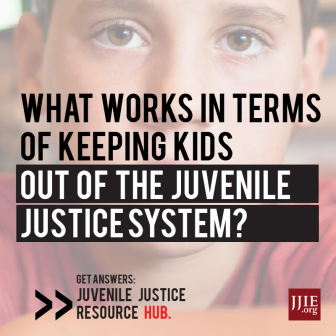
WASHINGTON — Defense teams representing juveniles facing possible life imprisonment should adhere to rigorous new guidelines designed to safeguard the youths’ constitutional rights, according to standards released today and endorsed by a wide array of legal advocates.
The Washington-based nonprofit Campaign for the Fair Sentencing of Youth (CFSY) released the 24-page “Trial Defense Guidelines: Representing a Child Client Facing a Possible Life Sentence” in response to findings of the U.S. Supreme Court in the landmark 2012 Miller v. Alabama decision.
“These kids are being sentenced to die in prison, and these guidelines are intended to raise the specialization and quality of defense,” said Heather Renwick, litigation counsel for CFSY, which opposes extreme sentences for young people.
“Miller really showed to the defense community the importance of and acted as an impetus for raising awareness around the specialization required in defending kids facing life sentences,” Renwick said. “Miller really got the ball moving as far as developing the guidelines.”
The 2012 Supreme Court decision declared unconstitutional mandatory life sentences for offenses committed by juveniles, citing characteristics unique to young people, including research on adolescent brain development.
The 5-4 high court decision did not, however, ban life sentences for juveniles, only mandatory ones.
The new CFSY guidelines call for a “national standard to ensure zealous, constitutionally effective representation” for all juveniles facing a possible life sentence and cite Miller’s holding that trial courts must “take into account how children are different and how those differences counsel against irrevocably sentencing [children] to a lifetime in prison.”
Representing defendants facing possible life sentences for crimes committed while juveniles is a “highly specialized area of legal practice,” the guidelines state, and as such, require teams comprising two attorneys, an investigator and a “mitigation specialist.”
At least one of the attorneys should have experience in dealing with defendants facing homicide charges, the guidelines say, and at least one should have experience representing youths.
 The investigator, who could come from a variety of educational and professional backgrounds, would be involved in the trial portion of the case, where guilt or innocence is determined. Typically a person with experience in this type of investigative work, the investigator should examine facts of the case on behalf of the defendant.
The investigator, who could come from a variety of educational and professional backgrounds, would be involved in the trial portion of the case, where guilt or innocence is determined. Typically a person with experience in this type of investigative work, the investigator should examine facts of the case on behalf of the defendant.
The mitigation specialist, who could have a background in psychology, social work or counseling, would become involved in the sentencing portion of a case and examine factors in a defendant’s life that could mitigate against a life sentence such as abuse, poverty, trauma, family history and education.
“I think one of the most important factors of the Miller vs. Alabama decision was that the court mandated that before a child is sentenced to life in prison, the court needs to take into account that child’s life, and that includes all of the hardships associated with that child’s life,” Renwick said. “All of that child’s life story needs to be taken into account and presented to the court.”
In the Miller decision, the court noted among other things that adolescents are prone to be highly susceptible to peer pressure, can be reckless and impulsive, and fail to take into account the long-term consequences of their actions. Research has shown adolescent brain development continues through the mid-20s, that most youths outgrow delinquent behavior and that youths are amenable to rehabilitation.
The new guidelines drew widespread praise from juvenile justice experts and child advocates.
“The Trial Defense Guidelines recognize that children need to be treated as children when facing a possible life-in-prison sentence,” said Marsha Levick, chief counsel and deputy director at the Philadelphia-based, nonprofit Juvenile Law Center, in an email. “The guidelines also will ensure a child receives a meaningful, individualized sentencing hearing before imposition of a sentence.
“Without effective and trained counsel, we risk losing the real fight for justice, which will unfold in courtrooms across the country,” Levick added.
Patricia Puritz, executive director of the nonprofit National Juvenile Defender Center in Washington, called the guidelines “long overdue” and said they should be uniformly adopted across the nation.
“It is unimaginable to me that a child facing the possibility of a life sentence in prison in the United States of America would not have the type of specialized defense counsel envisioned in the Trial Defense Guidelines,” Puritz said in a statement. “Simply stated, that seems unethical, immoral, and a fundamental denial of the constitutional and developmental differences between adults and children.”
CFSY drafted the guidelines in collaboration with attorneys and advocates from across the nation.
The guidelines have been endorsed by dozens of national and local organizations that provide defense services, including the Washington-based National Association of Criminal Defense Lawyers, the NAACP Legal Defense Fund in New York City, the Southern Poverty Law Center in Montgomery, Ala., the National Juvenile Defender Center and the Juvenile Law Center.

Pingback: Campaign for the Fair Sentencing of Youth Releases First-Ever Guidelines for Juvenile Life Defense | Reclaiming Futures